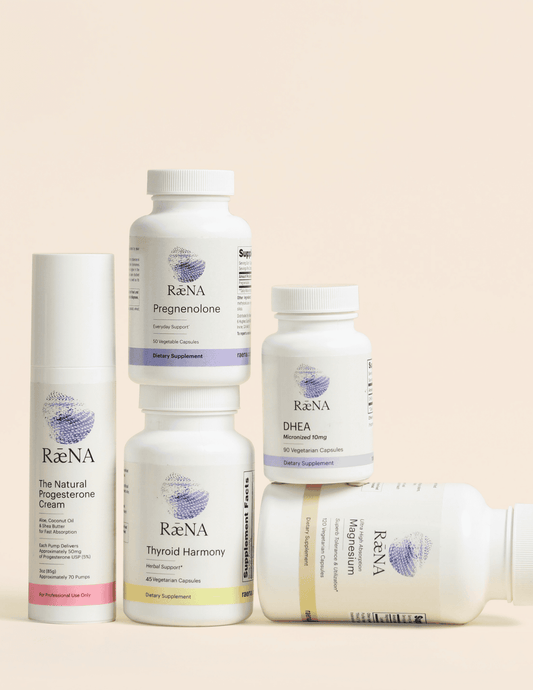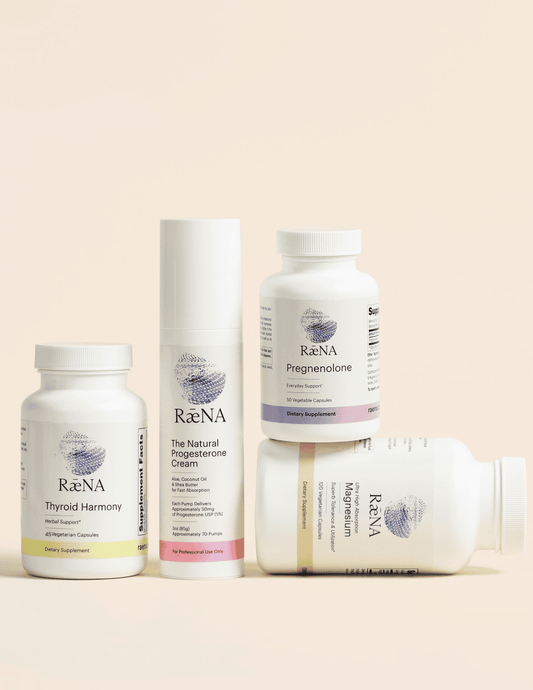
Hormonal imbalance is an under-recognized cause of low mood and depression
RaenaHormones and Depression: Understanding the Link
Depression is becoming increasingly common among adults. A recent study found that 27.5% of adults reported experiencing symptoms of depression. While the recent pandemic has contributed, it’s not the only cause of this rise.
Many researchers believe hormonal imbalances are an under-recognized factor in low mood and depression.
The role of estrogen in depression
High levels of estrogen may contribute to mental health issues. Estrogen is well known for its role in breast development and regulating the menstrual cycle, but it also affects stress response, cell growth, and can even promote cancer at high levels.
Research shows estrogen amplifies the brain’s stress response, especially in areas linked to depression and anxiety (J Affect Disord, 2003). Estrogen may increase sensitivity to stress (Mol Psychiatry, 2004), which could explain why women—who experience fluctuating and often higher estrogen levels—are twice as likely as men to suffer from depression.
One animal study found that female rats with high estrogen were more sensitive to stress, while ovariectomized females showed increased stress only after estrogen replacement. Similarly, women cycling through hormonal phases also show increased fear response and stress sensitivity (Toufexis et al., 2007; Milad et al., 2006).
DHEA and mood regulation
Low levels of DHEA (dehydroepiandrosterone), a hormone produced in the body and brain, may also play a role in depression. DHEA has neuroprotective effects and supports brain function.
DHEA peaks in your 20s but declines with age — by 40, your body makes about half as much, and by 80, less than 5% remains.
Studies have found:
-
Lower DHEA levels are linked to depression (Biol Psychiatry, 2000).
-
In men and women, higher DHEA levels are associated with fewer depressive symptoms (Psychoneuroendocrinology, 2007).
-
A clinical trial showed that after 6 weeks of DHEA supplementation, nearly half of patients with depression experienced a 50% reduction in symptoms. Some maintained these improvements for up to a year (Arch Gen Psychiatry, 2005).
Hormones and mental health: What you should know
Sex hormone imbalances — particularly high estrogen and low DHEA — are linked with depressive symptoms. Understanding your hormone levels could be key to managing mood and improving mental health.
To learn more about your hormone levels, consider ordering a hormone blood test kit from Raena.
References
-
Shors T, Leuner B. Estrogen-mediated effects on depression and memory formation in females. J Affect Disord. 2003 Mar. PubMed
-
Shansky R et al. Estrogen mediates sex differences in stress-induced prefrontal cortex dysfunction. Mol Psychiatry. May 2004. PubMed
-
Toufexis DJ et al. Estrogen disrupts the inhibition of fear in female rats. J Neurosci. 2007;27:9729–9735. PubMed
-
Milad MR, Quirk GJ. Neurons in medial prefrontal cortex signal memory for fear extinction. Nature. 2002;420:70–74. PubMed
-
Michael A et al. Altered salivary dehydroepiandrosterone levels in major depression in adults. Biol Psychiatry. 2000 Nov 15;48(10):989-95. PubMed
-
Morsink L et al. Associations between sex steroid hormone levels and depressive symptoms in elderly men and women. Psychoneuroendocrinology. Sep-Nov 2007;32(8-10):874-83. PubMed
-
Schmidt P et al. Dehydroepiandrosterone Monotherapy in Midlife-Onset Major and Minor Depression. Arch Gen Psychiatry. 2005;62(2):154-162. JAMA Psychiatry


